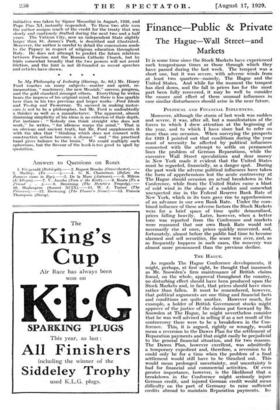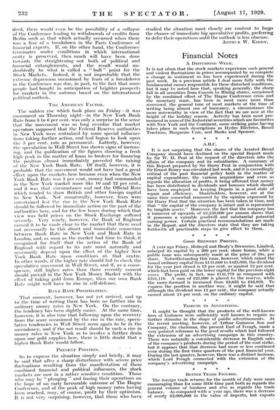Finance Public & Private
The Hague—Wall Street—and Markets
IT is some time since the Stock Markets have experienced such tempestuous times as those through which they have passed during the last week. The tempest was a short one, but it was severe, with adverse winds from at least two quarters—namely, The Hague and the United States. And while for the moment the tempest has died down, and the fall in prices has for the most part been fully recovered, it may be well to consider the causes and effect of these - unusual influences in case similar disturbances should arise in the near future.
POLITICAL AND FINANCIAL INFLUENCES.
Moreover, although the storm of last week was sudden and severe, it. was, after all, but a manifestation of the forces to which I drew ._attention .at the beginning of the year; and to which I. have since: had to refer on more than one occasion. When surveying the prospects for 1929 I pointed out that conditions during the year must of necessity be affected by • politiCal influences connected with the attempt to settle on perthanent lines the problem of German Reparations, while the :excessive Wall Street speculations and dear money in New York made it evident that _the United States must be regarded, financially, as a danger spot. During the past week the adverse political influences have taken -the form of apprehensions lest the acute controversy at The Hague should occasion an actual breakdown in the Conference, while from the United States came a blast of cold wind in the shape of a sudden and somewhat • - i unexpected rise in the Federal Reserve Bank Rate of New York, which in its turn gave rise to apprehensions of an advance in our own Bank Rate. Under the com- bined influence of these adverse factors the Stock Markets were for a brief space of time quite demoralized, prices falling heavily. Later, however, when a better tone was reported from the Conference and markets were reassured that our own Bank Rate would not necessarily rise at once, prices quickly recovered, and, fortunately, almost before the public had time to become alarmed and sell securities, the scare was OVer, and, as so frequently happens in such cases, the recovery was almost more pronounced than the previous decline.
THE HAGUE.
As regards The Hague Conference developments, it might, perhaps, at first sight, be thought that inasmuch as Mr. Snowden's firm maintenance of British claims found, on the whole, approval throughout the country, 'no disturbing effect should have been produCed upon the Stock Markets and, in fact, that prices should have risen rather than fallen. It must be remembered, however, that political arguments are one thing and financial facts and conditions are quite another. However much, for example, a holder of British Government stocks might approve of the justice of the claims put forward by Mr. Snowden at The Hague, he might nevertheless consider that he was well advised in selling if as a net result of the controversy there were to be a breakdown in the Con- ference. This, it is argued, rightly or wrongly, would mean a reversion to the Dawes Plan for the settlement of Reparation payments and that might easily be prejudicial to the general financial situation, and for two reasons. The Dawes Plan, however 'excellent, was admittedly a temporary expedient 'and, therefore, a reversion to it could only be for a IiMe when the problem of a final settlement would still have to be thrashed out. This would mean prolonged uncertainty, and uncertainty is bad for financial and commercial activities. Of even greater importance, however, is the likelihood that a breakdown in the Conference might seriously injure German credit, and injured German credit would mean difficulty on the part of Germany to raise sufficient credits abroad to maintain Reparation payments. In- deed, there would even be the possibility of a collapse of the Conference leading to withdrawals of credits from Berlin such as that which actually occurred when there was a fear of a breakdown in the Paris Conference of financial experts. If, on the other hand, the Conference terminates .under conditions in which international amity is preserved, then much will have been done towards the straightening out both of political and financial entanglements, and the result would un- doubtedly be what is called a " bull " point for the Stock Markets. Indeed, it is not improbable that the extreme depression occasioned by fears of a breakdown in the Conference was due, in part, to the fact that some people had bought in anticipation of brighter prospects for markets in the autumn based on the international political outlook.
THE AMERICAN FACTOR.
The sudden rise which took place on Friday—it was announced on Thursday night—in the New York Bank Rate from 5 to 6 per cent. was only a surprise in the sense that the movement was so long overdue that market operators supposed that the Federal Reserve authorities in New York were restrained by some special influence from taking further action, and had begun to look upon the 5 per cent. rate as permanent. Latterly, however, the speculation in Wall Street has shown signs of increas- ing, and the publication of the figures showing a fresh high peak in the matter of loans to brokers for financing the position almost immediately preceded the raising of the New York Bank Rate. Of itself, however, it is probable that the movement would not have had a great effect upon the markets here because even when the New York Bank Rate was 5 per cent. money had commanded in the New York market more like 10 and 12 per cent., and it was that circumstance and not the Official Rate which tended to draw British and other foreign capital to New York. Not unnaturally, however, fears were entertained lest the rise in the New York Bank Rate should be followed by immediate action on the part of the authorities here, and for the few hours during which that view was held prices on the Stock Exchange suffered severely. Very wisely, however, the Bank of England caused it to be made clear to the market that there need not necessarily be this direct and immediate connexion between Bank Rate in New York and Bank Rate in London, and, as soon as the market had time to think, it recognized for itself that the action of the Bank of England with regard to its rate must naturally and necessarily depend upon the effect of the higher New York Bank Rate upon conditions at that Centre. In other words, if the higher rate shotild fail to check the speculative movement in Wall Street, and if, as a conse- quence, still higher rates than those recently current should prevail in the New York Money Market with the effect of taking gold from Europe, then our own Bank Rate might well have to rise in self-defence. .
BANK RATE POSSIBILITIES.
That moment, however, has not yet arrived, and up to the time of writing there has been no further rise in ordinary money rates in New York. On the contrary, the tendency has been slightly easier. At the same time, however, it is also true that following upon the recovery from the scare occasioned by the rise in the rate, specu- lative tendencies in Wall Street seem again to be in the ascendancy, and if the net result should be such a rise in money rates in New York as to involve a further drain upon our gold supplies here, there is little dolibt that a higher Bank Rate would follow.
PRESENT POSITION.
So to express the situation simply and briefly, it may be said that after a sharp' disturbance with severe price fluctuations resulting from the manifestation of these combined financial and political influences, the stook markets are now in a rather sensitive condition. Those who may be " plunging " and basing their operations on the hope of an early favourable outcome of -The Hague Conference, and of the peak of high money rates having been reached, may, of course, profit by their optimism. If is not very surprising, however, that those who have studied the situation most closely are content to forgo the chance of immediate big speculative profits, preferring to defer their operations until the outlook is less obscure. ARTHUR W. KIDDY.

































 Previous page
Previous page